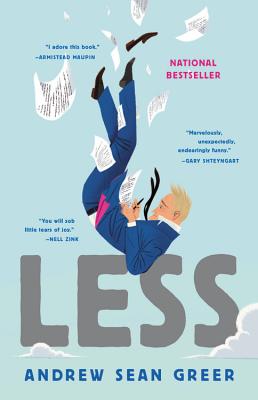 Less
Less
by Andrew Sean Greer
Little, Brown. 265 pages, $26.
LESS is a gem of a novel, combining humor and heartbreak. It tells the story of Arthur Less, a middling novelist on the verge of turning fifty, who, attempting to avoid the wedding of an ex-lover, agrees to attend a series of literary events all around the world. What follows is a comic romp in various exotic locations, with thoughtful considerations from Less about writing, aging, love, and relationships.
Arthur Less is an incredibly sympathetic character, delightful and funny for his foibles. He carries a Russian cosmonaut’s helmet onstage to interview H. H. Mandern, a much more popular science fiction author, because it seems a bookstore employee had instructed him “to dressup.” When he sobs at the end of a musical, the woman in the next seat comforts him, while he thinks, “Nothing happened to me. I’m just a homosexual at a Broadway show.” After a fellow author suggests that he’s “a bad gay” because he makes his “characters suffer without reward,” he can only reply, compelled “by the cruel checkmate of conversation: Thank you.”
The plot is also well constructed, with lots of amusing incidents. The fun begins in New York City, with Less almost missing his interview with Mandern due to a broken clock in the hotel lobby and a mistaken assumption by his escort. While teaching a class in Berlin, he falls ill and, locking himself out of his apartment, nearly kills himself trying to get in. Traveling through a sandstorm in Morocco with an eccentric group of expatriates, he finds himself in a ski chalet that belongs more in Switzerland. He accidentally locks himself in a dining room in Japan. At an author’s party in Paris, he has a fascinating conversation with a charming man, finding himself falling in love, only to realize the man is already in a relationship. During a writer-in-residence stint at a Christian retreat in southern India, he steps on a piece of glass and is rushed to a hospital.
All the while, he thinks about his nine-year affair with the soon-to-be-married Freddy, the nephew and adopted son of a rival author. While a casual relationship, with neither Less nor the much younger Freddy considering anything serious, Less finds himself unexpectedly surprised and heartbroken when it ends. The novel is a real pleasure to read, sad and funny at once, seemingly light while offering much to ponder afterwards.
_______________________________________________________________





